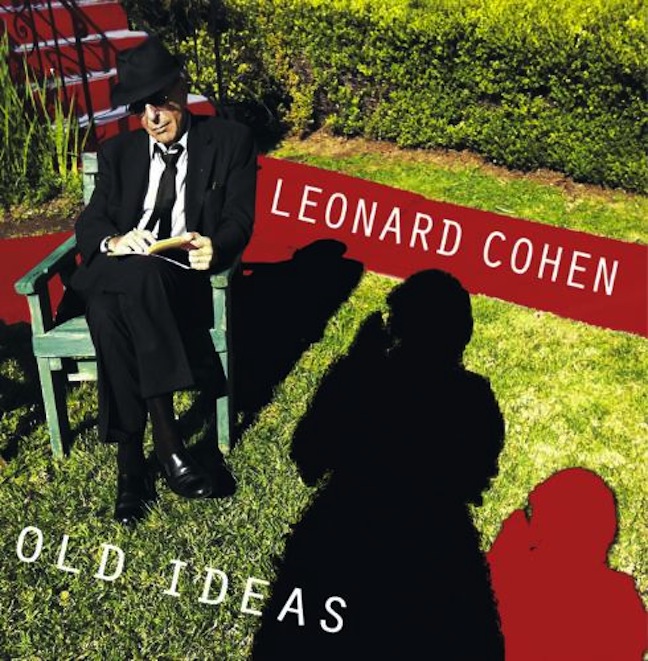Videos by American Songwriter
Leonard Cohen
Old Ideas
(Columbia)
[Rating: 4 stars]
Leonard Cohen’s twelfth studio album in forty-four years opens curiously with a song titled “Going Home,” which both introduces Leonard Cohen as an artist and details the metaphysics of his own creativity. The man needs no introduction, of course: Everybody knows who Leonard Cohen is. We may not necessarily think of him as “a sportsman and a shepherd” or “a lazy bastard in a suit,” but we know the Canadian as a man with a physical voice so deep it sounds like a black hole and a lyrical voice so ominously Old Testament that his business card probably lists him as a singer-psalmwriter.
Stream Old Ideas In Its Entirety
But this insight into his process is a very different side of Cohen, one not often glimpsed in the past. “Going Home” is sung from the point of view of his own muse, a godlike figure who’s bemused by the artist/puppet at his command: “But [Leonard] does say what I tell him, even though it isn’t welcome,” says the demi-diety. “He just doesn’t have the freedom to refuse.” It’s a sneaky ploy, allowing Cohen to downplay his role in constructing his own tower of song while winking at his own lyrical cleverness. As an explication of his own artistic process, “Going Home” proves a fitting start to an album that balances levity with gravity, jarring straightforwardness with literary sleight of hand.
Like Dylan, Cash, and Philip Roth, Cohen has entered his 70s with renewed vigor and puckishness. His voice has grown deeper in recent years, which once seemed impossible, and while it has lost much of its former agility, it has taken on deeply etched textures that convey a sense of authority gained from experience. His years show through in every uttered syllable and sigh. And despite his advancing age and his recent financial troubles—he found himself nearly bankrupt after his former manager siphoned off millions of dollars—Cohen has over the past decade released a string of strong albums examining new facets of his evergreen themes: the sadomasochism of faith and love, the comforts and challenges of music, his place in this world as well as in the world beyond this world.
In some ways, Old Ideas comes across like a putting-his-affairs-in-order album, and it’s not his first. Of course, there’s always been a bit of Nebuchadnezzar in Cohen, who was an old man of 34 when he released his debut in 1968 and was even then singing about the ineluctable flow of time and the inevitable entropy of our physical selves. And yet, these new songs never grow repetitive, tedious, or dour, which is remarkable given the subject matter and his unchangeable tone of voice. The worst aspect of Old Ideas is that cover, which Cohen himself designed. The second worst is the backing vocals, although that could be said of almost all of his albums. The man has a weakness for female vocals, and here they sound a bit dated, like refugees from earlier in his career. And yet, they have the perhaps unintended effect of lightening these songs at least somewhat, of diffusing a least a bit of that darkness.
It’s remarkable, in fact, that it’s taken Cohen nearly half a century to write a song called “Darkness,” but it’s a sly number that only reveals itself as a blues after a few minutes of repetition and build. As he sings about oblivion and possibly VD, an acoustic guitar bleats out lewd chords and an organ thrums vigorously. Despite the constraints of his voice, these songs prove diverse and eclectic, with unexpected flourishes of sound to distinguish them: the spectral banjo and trumpet solo on “Amen,” the valedictory gospel piano on “Show Me the Place,” the lovely flamenco guitar that dances through “Crazy to Love You.”
Similarly, you barely notice just how much vocal range Cohen has, but there are erotic sighs and hipster-poet recitations, deep grumbles and resigned fades. At times, the songs trudge by at the same tempo and in the same mood, but it never grows tiresome or monochromatic. Cohen still entertains intense Biblical imagery, which at times barely skirts self-parody. “Tell me where you want your slave to go,” he incants on “Show Me the Place.” “Tell me again when the angels are panting and scratching at the door to get in,” he intones on “Amen.” “I’m naked and I’m filthy and there’s sweat upon my brow,” he sings on “Anyhow.” Depending on your threshold for grandiose thoughts about romantic and spiritual subjugation, Old Ideas wastes no time before soaring into the realm of the ridiculous.
Of course, that’s part of Cohen’s lasting appeal: He refuses to back away from any old idea, no matter how baroque or abstract. Perhaps more crucially, he has the tenacity to sing these songs in the present tense instead of the past. Old Ideas isn’t an album about reminiscing over younger days and youthful exploits, and Cohen isn’t packing his bags for the next world just yet. Instead, he comes across as a man still deep in the throes of religious and romantic upheaval, invigorated rather than intimidated by the nearness of death.














Leave a Reply
Only members can comment. Become a member. Already a member? Log in.